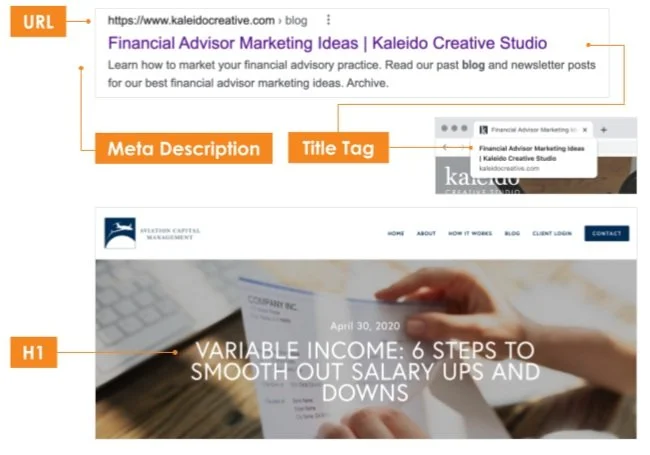SEO Basics for Blog Writing
In this module, you will learn the basics of search engine optimization (SEO) and its importance to your blog.
In this module, you will learn the basics of search engine optimization (SEO) and its importance to your blog.
Search engine optimization is the process of maximizing the number of visitors to your website by ensuring that your site appears high on the list of results from a search engine such as Google. In other words, search engine optimization is using different strategies to rank your website at the top of the page on Google when someone searches for a phrase relevant to your business.
SEO can be an important part of your marketing, but often, people place too high of hopes on it. They expect SEO to be the silver bullet of their marketing. This is just not the case, and you should not rely on SEO for leads alone. Here’s why:
Your market may not be searching for your services online. Let’s say your niche is real estate agents. There are very few people nationally searching for real estate financial advisors because they don’t know such advisors exist. Most of the search terms with “real estate” and “financial advisor” are focused on financial advisors who incorporate real estate into their advice. That is a completely different market.
You can’t control it. Algorithms are always changing. This means you may rank first today for a keyword, and tomorrow Google changes its algorithm and you are now on Page 10.
Web leads are not always good leads. You will find that your best leads are ones who have followed your business for a while. People who search for you online and immediately reach out have no history with you. Many of these leads won’t be qualified. If they are qualified, the close rate will be lower than what you are used to.
High-ranking content does not always convert. Just because an article generates a lot of traffic doesn’t mean it will lead to appointments. For example, articles about moving out of state in retirement can rank high but don’t lead to appointments since no one wants to hire a local advisor if they plan on getting out of town.
There are four factors that impact how search engines like Google rank your website:
On-page factors, or the way the page is optimized.
Site factors, such as having a mobile-optimized website and setting up a sitemap.
Off-page factors, which include the number and quality of links coming from other websites back to your site.
Domain factors, such as how long your domain has been registered.
This training focuses on on-page factors since these are important when writing your content. Specifically, this training will teach you to:
Include the focus keyword in your title, meta title, meta description, URL, headers, subheaders, and copy.
Include semantically related keywords and synonyms in headers, subheaders, and copy.
Localize your content, including neighborhoods, landmarks, businesses, and events.
Write to the recommended word count.
Include two internal links and two external links.
The first step in optimizing your on-page content is to search for the keywords you will use in your blogs. We recommend you hire an SEO expert to do this. This person will find the best keywords for each topic based on a combination of factors such as:
Words you already rank for and can improve upon
Words your niche would use to find an article like yours
The volume of the search for those words
The competition or difficulty in ranking for those keywords
The primary word (or phrase) you choose for each article is called your focus keyword. This is the keyword you will optimize the article for.
There are also semantically related keywords. These are simply words or phrases that are related to each other conceptually. When ranking webpages, Google doesn’t just look for matching keywords. It attempts to identify the intent and deeper meaning of a search based on each of the words used in the query. Essentially, Google is trying to understand language on a higher level in order to serve accurate search results.
Your SEO expert should provide you with semantically related keywords in addition to your focus keyword. You should consider incorporating those keywords into your content when it is appropriate and makes sense.
Keywords are the words and phrases in your web content that make it possible for people to find your site via search engines. Keywords are used primarily in five different areas:
Title tag (meta title)
Meta description
Webpage URL
Header (H1)
Page copy

Let’s look at how to write with SEO in mind through an example. The focus keyword in our example is “niche marketing.” The first thing you want to do is to use this focus keyword in your blog title. The rule of thumb is to integrate all the words into your title. However, you don’t need the title to match the term exactly. Google algorithms can understand the searchers’ intent, which is a good thing because the words people use to search don’t make for good titles. While optimizing for search engines is important, piquing people’s interest is also important, so you need to find a balance between the two.

Use your focus keyword in your meta title and meta description. This is the title and description that show up in search results. If you don’t write your own, Google will choose its own title and description for you.
Include the focus keyword in the URL. Usually, the website host will automatically generate the URL using the exact blog title, so you shouldn’t have to make any adjustments. Some SEO experts like to include additional keywords in their URLs, but for now, keep yours the same title as the blog.

Finally, include the focus keyword in one of your headers or subheaders and in the copy of your content. You don’t want to overdo this, so once or twice is plenty.

Include semantically related keywords—the words or phrases that are conceptually related to the focus keyword and each other—throughout your text whenever it makes sense. These words provide context for Google and should help your content perform better in search results. Include synonyms for your focus keyword throughout your text as well. For example, if your focus keyword is “financial planning for physicians,” you would use synonyms like wealth management, financial advice, doctors, and medical professionals.

When working with a niche, you can attract clients from all over the country. However, it may make sense for you to limit your niche to your local area. If this is the case, incorporate location words into your content. This includes mentioning local neighborhoods, landmarks, companies, and events. For example, you are in San Diego and are writing about the tax benefits of owning rental properties. You localize your article by giving an example of having a rental property in La Jolla near the University of California San Diego. You also mention San Diego property tax rates and California income tax and capital gains tax rates.
Only do this if your niche is looking for a local advisor. For example, our niche is RIAs. They don’t expect a marketing professional who has expertise in the industry to be in their local area, so we never localize our content. For us, it would be limiting. Decide whether focusing on your local market is important before localizing your content.

In addition to optimizing your content for keywords, there are non-keyword-related best practices to implement.
Your SEO expert may provide you with a recommended word count. This number comes from software that analyzes the top-performing search results for your focus keyword. It tells you the average length of an article you are competing against. Google rewards longer content, so this number will give you an idea of how much you need to write. That being said, do not use filler text that doesn’t add value just to get to that word count recommendation. Write a compelling article first; optimize it for searches second.

Add two internal links to other content on your website. For example, when writing about the tax benefits of owning a rental property, capital gains taxes are sure to be mentioned. We would hyperlink the words “capital gains tax” to a previous blog on our site about proposed changes to capital gains.

Add two external links to reputable websites that add value and can serve as a reference. For the rental property article, we would link to the page titled “Tips on Rental Real Estate Income, Deductions and Recordkeeping” found on the IRS’s website. It’s a best practice to link to a specific, relevant page on a website and not just the homepage whenever possible.
At this time, we have only one SEO expert we recommend. We are also providing a link to Upwork, which is a website where you can search for a variety of freelancers.